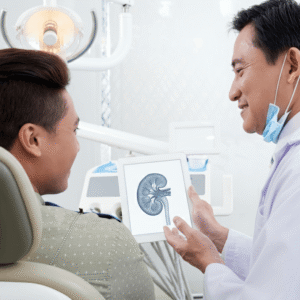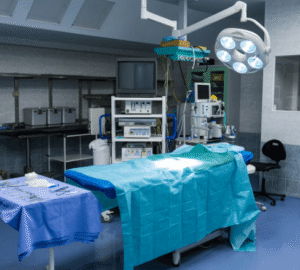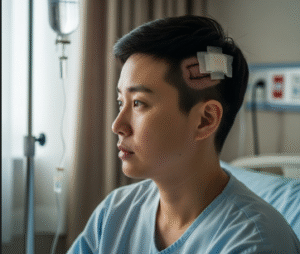Overview
Frequent urination, also known as polyuria, is the need to urinate more often than usual, sometimes accompanied by urgency or discomfort. It can be a temporary symptom caused by lifestyle factors, or a sign of underlying medical conditions affecting the urinary tract, kidneys, or metabolic system. In Korea, hospitals and urology clinics offer comprehensive evaluation, treatment, and management of frequent urination.
Key Facts
▶ Prevalence: Common among adults, particularly older adults, diabetics, and pregnant women.
▶ Causes: Urinary tract infections, diabetes, bladder disorders, prostate problems, medications, or hormonal changes.
▶ Associated Symptoms: Urgency, nocturia (nighttime urination), pain or burning, incontinence, and thirst.
▶ Treatment Options in Korea: Lifestyle modifications, medications, bladder training, minimally invasive procedures, and management of underlying conditions.
▶ Urgency: Persistent or worsening frequent urination requires prompt evaluation to prevent complications.
What is Frequent Urination?
Frequent urination is defined as urinating more often than normal, typically more than 8 times per day, sometimes accompanied by nighttime urination (nocturia).
▶ Temporary Polyuria: Can occur after high fluid intake, caffeine, or alcohol.
▶ Pathological Polyuria: Associated with diseases like diabetes, urinary tract infections, or bladder disorders.
▶ Nocturia: Waking multiple times at night to urinate, often disrupting sleep.
▶ Urinary Urgency: Sudden, strong need to urinate, sometimes leading to incontinence.
▶ Associated Impact: Can affect sleep, daily activities, work performance, and quality of life.
Note: Identifying the underlying cause is essential for effective management.
What Symptoms Are Related to Frequent Urination?
▶ Increased Daytime Urination: Urinating more than 8 times per day.
▶ Nocturia: Waking at night to urinate multiple times.
▶ Urgency: Sudden, compelling need to urinate.
▶ Pain or Burning Sensation: Often indicates urinary tract infection.
▶ Incontinence: Accidental leakage due to urgency or bladder dysfunction.
▶ Excessive Thirst: Common in diabetes-related frequent urination.
▶ Fatigue: Sleep disruption from nocturia can cause daytime tiredness.
▶ Lower Abdominal Discomfort: Cramping or pressure associated with bladder irritation.
What Causes / Possible Causes
Frequent urination can result from urinary, metabolic, or systemic factors:
▶ Urinary Tract Infection (UTI): Bacterial infection irritates the bladder lining.
▶ Diabetes Mellitus: High blood sugar increases urine output.
▶ Diabetes Insipidus: Hormonal disorder affecting kidney water balance.
▶ Bladder Disorders: Overactive bladder, interstitial cystitis, or bladder stones.
▶ Prostate Problems (Men): Benign prostatic hyperplasia (BPH) or prostatitis.
▶ Medications: Diuretics, caffeine, or certain blood pressure medications.
▶ Pregnancy: Hormonal changes and pressure on the bladder increase frequency.
▶ Excessive Fluid Intake: High water, caffeine, or alcohol consumption.
▶ Neurological Conditions: Multiple sclerosis, spinal cord injury, or nerve dysfunction affecting bladder control.
Note: Proper evaluation is crucial to treat the underlying cause, not just relieve symptoms.
When Should I See a Doctor?
▶ Persistent Frequent Urination: Lasting more than a few days without clear cause.
▶ Pain, Burning, or Blood in Urine: May indicate infection, stones, or kidney disease.
▶ Urgency or Incontinence: Affecting daily life or causing accidents.
▶ Associated Symptoms: Fever, lower back pain, swelling, or unexplained weight loss.
▶ Diabetic Patients: High urine frequency may indicate poor blood sugar control.
▶ Children or Elderly: Urinary frequency may signal infection, neurological issues, or other systemic problems.
▶ Sudden Onset: Rapid change in urination patterns requires prompt evaluation.
Tip: Korean urology and internal medicine clinics provide comprehensive diagnostics including urine tests, blood tests, ultrasound, and specialist consultation.
Care and Treatment
Treatment depends on underlying cause, severity, and patient-specific factors:
▶ Lifestyle Modifications: Limit caffeine, alcohol, and fluid intake before bedtime.
▶ Bladder Training: Scheduled voiding, delayed urination techniques, and pelvic floor exercises.
▶ Medications: Anticholinergics or beta-3 agonists for overactive bladder; antibiotics for infections.
▶ Monitoring Blood Sugar: Essential for diabetics to manage polyuria.
▶ Hydration Balance: Adequate water intake without excessive fluids.
▶ Addressing Prostate Issues: Medications or minimally invasive procedures for BPH.
▶ Avoid Irritants: Spicy foods, artificial sweeteners, or carbonated beverages that may worsen symptoms.
▶ Patient Education: Recognizing triggers and managing lifestyle factors to reduce frequency.
Treatment Options in Korea
Medical Evaluation:
▶ Urine Tests: Detect infection, blood, protein, or sugar.
▶ Blood Tests: Assess kidney function, blood sugar, electrolytes, and hormone levels.
▶ Imaging Studies: Ultrasound, CT, or cystoscopy to examine bladder and urinary tract.
▶ Specialist Consultation: Urologists, nephrologists, and endocrinologists provide targeted care.
Advanced Therapies:
▶ Medications for Overactive Bladder: Reduce urgency and frequency.
▶ Minimally Invasive Procedures: For bladder outlet obstruction, stones, or prostate enlargement.
▶ Surgical Intervention: Reserved for severe structural or obstruction-related issues.
▶ Multidisciplinary Care: Integrated approach involving urology, endocrinology, and lifestyle counseling.
Rehabilitation & Support:
▶ Patient Education: Lifestyle changes, bladder retraining, and symptom monitoring.
▶ Follow-Up Care: Ensures effective treatment and prevention of recurrence.
▶ Specialist Clinics: Korean hospitals provide comprehensive care programs combining diagnostics, medical management, and lifestyle interventions.
Outcome: With early evaluation and comprehensive treatment in Korea, frequent urination can be effectively managed, improving bladder control, reducing discomfort, and enhancing quality of life.













